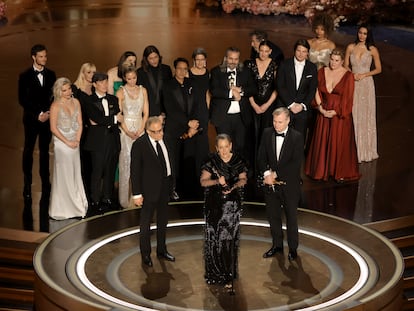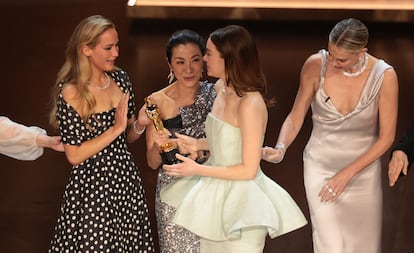‘Oppenheimer’ dominates Oscar night, winning seven awards
Emma Stone wins her second Academy Award for ‘Poor Things,’ the Yorghos Lanthimos film that took home four prizes

The 2024 Oscars belonged to Oppenheimer. The biography of the father of the atomic bomb won seven statuettes on Sunday, including Best Picture, Best Director and the two male acting awards. The triumph of the film about the progress of the Manhattan Project took place while a thousand people demonstrated outside the Dolby Theater to demand a ceasefire in Gaza. “We are living in Oppenheimer’s world, so I really want to dedicate this to the peacemakers everywhere,” said Irishman Cillian Murphy, one of the 10 actors nominated for the first time, who took home Oscar for Best Actor for his role as the American physicist in what was his sixth collaboration with Christopher Nolan. Poor Things won four awards, including Best Actress for Emma Stone.
Hollywood wanted to celebrate, but reality came knocking on the doors of the Dolby. Nearly a thousand people protested outside the theater, which was under heavy LAPD security. Demonstrators waved Palestinian flags, and blocked traffic before the start of the ceremony, which hindered the arrival of the stars in their limousines. Carlos Bayona, brother of Juan Antonio Bayona, director of Society of the Snow, got out of the car ahead of schedule to walk to the theater. Carey Mulligan, nominated for best actress for Maestro, entered the theater after the first award —for best supporting actress — had been presented to Da’vine Joy Randolph, for The Holdovers.
The ceremony, which this year aired an hour earlier than usual, started late. Comedian Jimmy Kimmel, who hosted the ceremony for the fourth time, spoke about the months-long actors and screenwriters strike, but did not bring up the war in Gaza, which has killed more than 30,000 Palestinians, many of them innocent minors. The first reference to the war was made by Jonathan Glazer, the director of The Zone of Interest, which won the Oscar for Best International Film and Sound. “Our film shows where dehumanization leads at its worst. It’s shaped all of our past and present,” said the British filmmaker. “Whether the victims of October 7 in Israel or the ongoing attack in Gaza [...] How do we resist this dehumanization?” he added.
This was a night of redemption for Christopher Nolan, who was first nominated in 2001 for the screenplay of Memento. Before Hollywood became a superhero movie factory, the filmmaker achieved box-office and critical success with his Batman trilogy. The second installment, where he directed a brilliant Heath Ledger, was overlooked in the 2009 Best Picture nominations. This caused such an uproar that it prompted the Academy to expand the main category from five to 10 films to accommodate more movies. In 2017, Nolan received his first nomination as a director, for Dunkirk. Today he is considered one of the most important talents in the industry, so much so that he is even compared to Stanley Kubrick.

Another actor with long experience in superhero films was also awarded for the first time. Robert Downey Jr. received his first nomination 32 years ago for playing Charlie Chaplin in Richard Attenborough’s film Chaplin. Today he won the Oscar for Best Supporting Actor for playing another real person, Lewis Strauss, the commissioner of the Atomic Energy Commission, who serves as the antagonist in Oppenheimer. “I’d like to thank my terrible childhood and the Academy, in that order,” the actor said in his acceptance speech. Prior to the years as Marvel’s Iron Man, his career was marked by addiction problems. “I needed this job more than it needed me,” he added.
Emma Stone starred in one of the great moments of the night when she picked up her second Oscar for Best Actress. The star won the award for her portrayal of Bella Baxter, the creation of Godwin Baxter in the film Poor Things, directed by Greek director Yorgos Lanthimos and written by his collaborator Tony McNamara. The film took home four awards on Sunday. Many in the theater were surprised by Stone’s win. Although Stone was the favorite, the pools also gave a chance to Lily Gladstone, who was the first Native American to be nominated for best actress for her role Killers of the Flower Moon. The film by Martin Scorsese, who at 81 was the oldest nominee in the directing category, came up empty-handed. The same happened with Scorsese’s movies The Irishman and Gangs of New York.
The Poor Things team was one of the most supportive of Gaza. They wore a blood-red pin to demand a ceasefire. “It’s a universal message of, ‘Let’s stop killing kids. Let’s not be part of more war.’” said Ramy Youssef, one of the actors. Billie Eilish, who won her second Oscar for the Barbie song, What Was I Made For? also wore it proudly on her outfit.
Japanese animation genius Hayao Miyazaki, who did not travel to Los Angeles, won his third Oscar for The Boy and the Heron, a film that took seven years to produce. It is the first Oscar he has won since 2014, when he was awarded an honorary Oscar for his career. European filmmakers did not leave empty-handed either. In addition to Glazer’s awards, Justine Triet and Arthur Harari, the French artist couple who used marital tensions as the basis of the thriller Anatomy of a Fall, took home the Oscar for original screenplay.
Sunday officially ended the year started by the Barbenheimer phenomenon. Oppenheimer triumphed and Barbie is left with the victories she achieved at the box office. Kimmel kicked off the night by digging into the wound, asking for recognition for Greta Gerwig, the director of the film about the Mattel doll. Gerwig was not nominated even though Barbie was the blockbuster of the year, grossing more than $1.4 billion. “I know you’re clapping but you’re the ones who didn’t vote for her,” Kimmel said. So began the night in which Hollywood celebrated the industry.
Sign up for our weekly newsletter to get more English-language news coverage from EL PAÍS USA Edition
Tu suscripción se está usando en otro dispositivo
¿Quieres añadir otro usuario a tu suscripción?
Si continúas leyendo en este dispositivo, no se podrá leer en el otro.
FlechaTu suscripción se está usando en otro dispositivo y solo puedes acceder a EL PAÍS desde un dispositivo a la vez.
Si quieres compartir tu cuenta, cambia tu suscripción a la modalidad Premium, así podrás añadir otro usuario. Cada uno accederá con su propia cuenta de email, lo que os permitirá personalizar vuestra experiencia en EL PAÍS.
¿Tienes una suscripción de empresa? Accede aquí para contratar más cuentas.
En el caso de no saber quién está usando tu cuenta, te recomendamos cambiar tu contraseña aquí.
Si decides continuar compartiendo tu cuenta, este mensaje se mostrará en tu dispositivo y en el de la otra persona que está usando tu cuenta de forma indefinida, afectando a tu experiencia de lectura. Puedes consultar aquí los términos y condiciones de la suscripción digital.








































